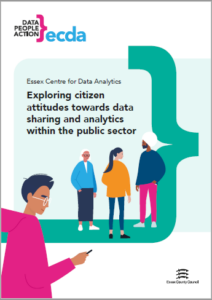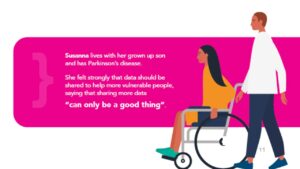The only thing we have to fear is...fear itself — nameless, unreasoning, unjustified terror which paralyses needed efforts to convert retreat into advance.
So said Roosevelt in his inaugural speech way back in 1933, yet there’s something that feels very current about his advice when applied to our present data sharing culture within the public sector.
ecda won an award for the Best Use of Local Area Research from LARIA (Local Area Research and Intelligence Association) in May for our research Exploring Citizen Attitudes Towards Data Sharing and Analytics within the Public Sector. I mention this not to boast, (ok maybe I want to brag a little, we’re super-proud!) but rather to explain the penny-dropping moment that occurred when completing the LARIA award application. The submission form gave us an ever-so-generous 50-word limit to describe the wow factor of our research, for me choosing one thing from the huge amount of insight that we gathered was a challenge. And then it struck me, in asking people about their attitudes and beliefs towards data sharing what we learned most was about FEAR.
Fear on the part of citizens and the public sector has been standing in the way of collaboration around data joining and analytics.
Back to the beginning
In March 2020 we set out to discover what residents living in Essex thought about our work to date. We wanted to understand in detail the current attitudes of our citizens; how do they really feel about Councils joining data with Police and hospitals in Essex. Actually, we wanted more than to simply know how they felt, we wanted to build our understanding around their attitudes by exploring any tensions or negative opinions residents may have and spending time with them to identify potential levers of change; discover to what extent citizens trust public service providers, and where they may need greater reassurance and changes in practice, including data ethics and governance, and engagement.
As a prerequisite to delivering a qualitative research programme we began by including some research questions in the annual Essex residents survey to find out how people felt about the sharing and use of data to identify issues early, intervene and protect and prevent people from harm. We analysed the volume of data available from the survey to inform our qualitative research, and you can find that analysis here.
to find out how people felt about the sharing and use of data to identify issues early, intervene and protect and prevent people from harm. We analysed the volume of data available from the survey to inform our qualitative research, and you can find that analysis here.
For our deliberative sessions we recruited a range of individuals from across the county who had experienced a variety of vulnerabilities, conditions, and life circumstances. Our approach to the research was intended to be continuously evolving, seeking a community-created view. It was not intended be exhaustive, but to be sufficiently informative to identify priorities and guide our work.
Understanding fears around data
Our research concluded that people are relatively open to the idea of data sharing when it is explained to them. In fact, seven in 10 residents surveyed agreed with data sharing for social good. Yes, they have some valid concerns that need addressing, some of which can be more easily tackled through better communication and collaboration, while others may require longer term work by involving citizens in developing data technologies and ecosystems within government. However, what was abundantly clear was that many of both citizen and public sector fears are based on misconceptions that have stemmed from a lack of clarity and opportunity to discuss data together.
The people that we spoke to as part of our research often reacted negatively initially to the idea of organisations joining data. Their reaction was based on a set of assumptions that:
- Local government would share personally identifiable data
- There are no limits on who in an organisation would see the data
- There are no limits on what data is being shared
- And the safeguards in place are minimal.
This made them fear:
- Being exposed, discriminated, and labelled
- Trusting people and organisations with their data
- Not having a choice of how their data was used
- Not being involved in the design of services that data derived insights are informing.
For those of us in the public sector pursuing our ambitions to intervene early and prevent harm from occurring we have remained cautious in our approach to unlocking the potential of our data, concerned that people do not want data joining to happen, underconfident in our ability to combat perceived citizen reluctance. Until now!
Overcoming our fears
The citizens that took part in our research burst that bubble of fear! They clearly articulated the minimum standards and conditions that they expected to be in place to guide data joining and analytics between public sector organisations. This meant that they were generally willing to look for solutions that enabled data joining and analytics to be carried out in a safe and secure way that protected their personal rights.
Not surprisingly our residents told us that our work, the methods of collecting and analysing data, the legal parameters around sharing, the ethical frameworks in place, are all tricky concepts to understand – I defy anyone to explain pseudonymisation to their neighbours this evening in a clear and concise way!
Only when we took the time to; find a frame of reference that would make our work meaningful for everyone; develop communications that clearly explain how we join and analyse data in a safe and secure way; invest in having a conversation that built understanding and provided a space for reflection and discussion, did we allay peoples fears, and in doing so dispelled the myth that we had created for ourselves around a general reluctance to join and analyse data.

The citizens of Essex entrust their data to us, investing in engaging them in open and honest conversations about our work enabled us to explore their views on using data and it was so so valuable, and the least they deserve. Thanks to the people of Essex we have created a reflective, practical, and critical understanding that has shaped our policies and practices, given us a blueprint for how we continue to have meaningful engagement and has enabled us to begin to build trust.
Our citizens’ unique perspective on the purposes, design and application of data analytics within the Essex system has and will continue to contribute significant social and technological robustness. From project inception to triangulating insight with their experiences, from ethical governance to co-commissioning services and evaluating impact, only by truly working together with our citizens do we have an opportunity to realise the full potential that data has to offer us all.
You can read full research report here.
Nothing in life is to be feared, it is only to be understood. Now is the time to understand more, so that we may fear less.
Marie Curie